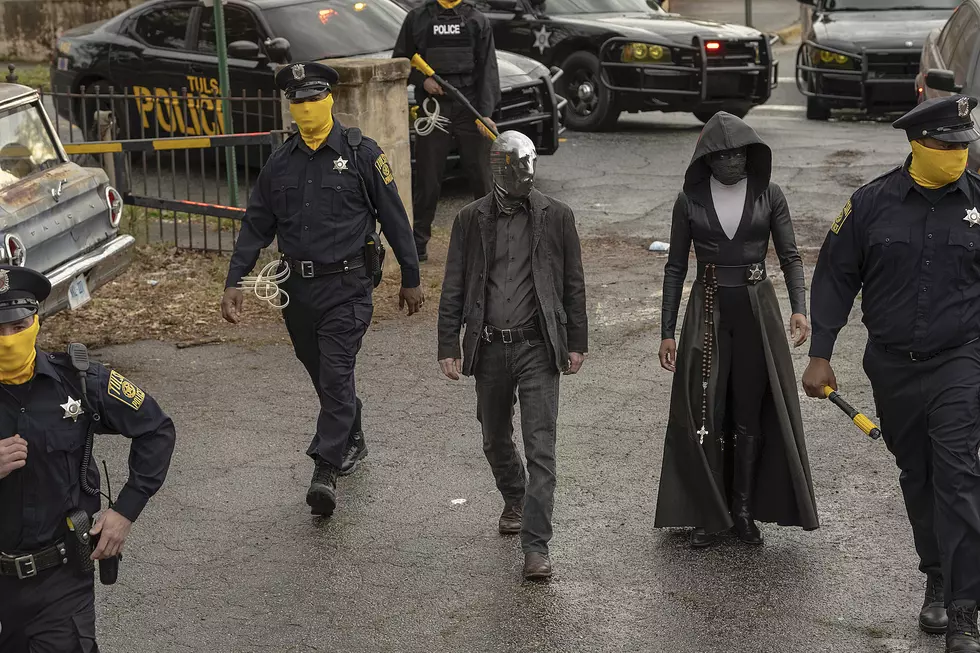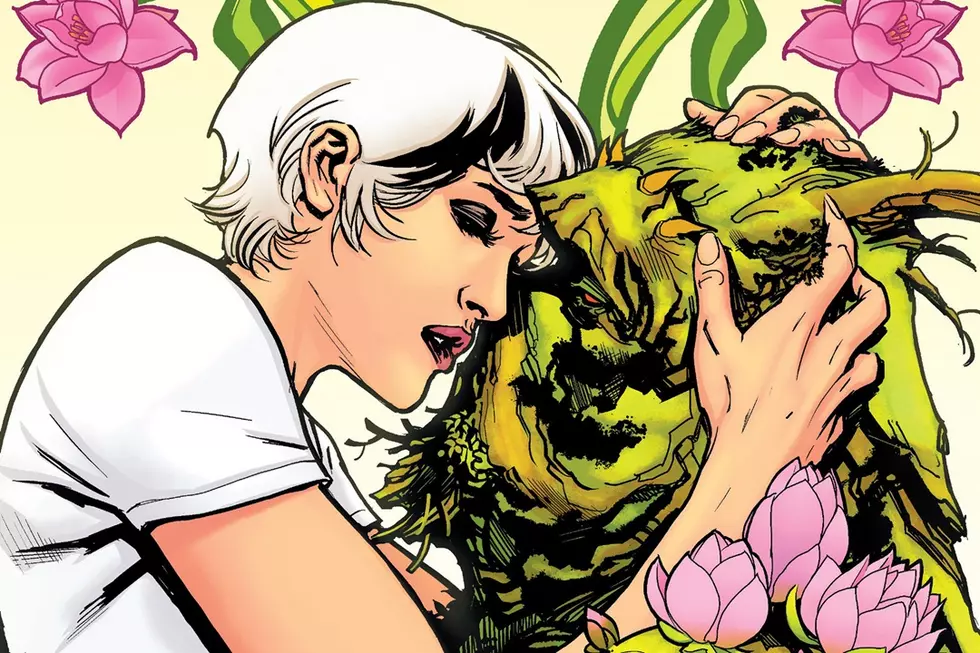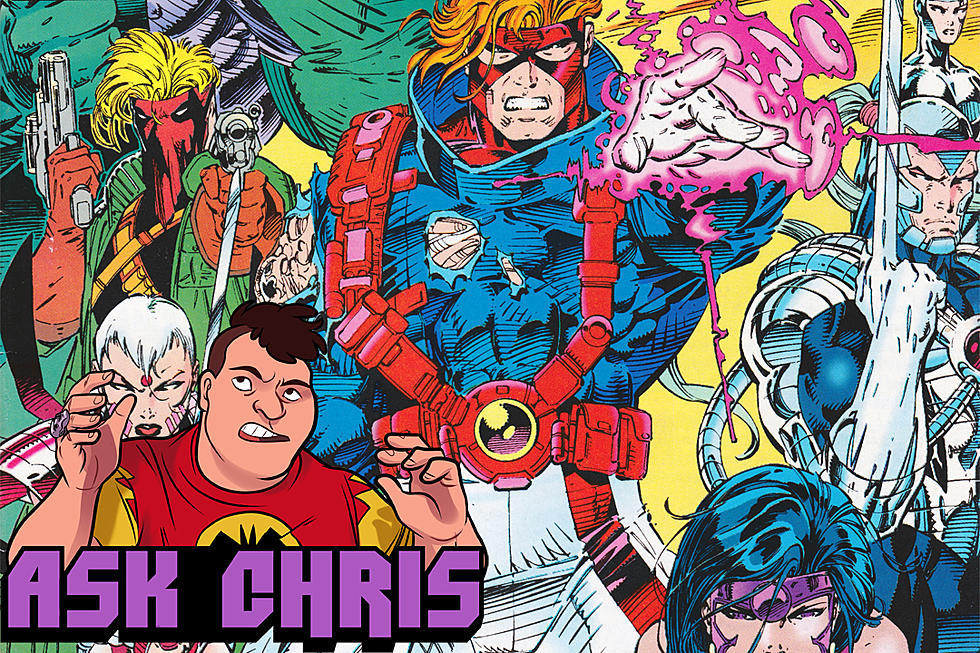
The Wizard: A Birthday Tribute to Alan Moore
Born today in 1953 in Northampton, England, Alan Moore grew up to be a giant. His impact on comics is so vital and apparent that even reporting on his accomplishments feels both daunting and profoundly unnecessary. Widely regarded as the best comics writer of all time, Moore's influence is without question; his presence an articulate line of demarcation carving up the medium into two decidedly different eras. Moore is a juggernaut, monolithic in both influence and intractability, with a true legacy even greater than his supposed one.
Alan Moore's rise to prominence in the mid-1980s ushered in a massive shift in superhero comics. Along with a few others, Moore midwifed an incredible period of growth for the genre, raising both its overall IQ and its cultural acceptability, and exploring the largely untapped possibilities of the comic book medium.
What Moore did was not completely unprecedented: he took his structural and storytelling cues from Harvey Kurtzman and Will Eisner, and found inspiration in the experimentation of the underground. Before Moore, a swath of second-generation creators --- Roy Thomas, Len Wein, Jim Starlin, Denny O'Neil, Chris Claremont, etc. --- had imported influences from poetry and literature, and urged superhero comics into areas of greater eloquence, social relevance, and thematic maturity. Moore just did it better.
By the time Moore made his American debut in the pages of Swamp Thing, he'd been a premier name in British comics for a little while. After cutting his teeth on what must have been dozens of 'Future Shock' shorts for 2000 AD, he made his first big leap in Captain Britain and carried that over into V For Vendetta and Marvelman, a watershed moment for the superhero genre.
Realism had previously found its way into superhero comics in dribs and drabs; never in such a well-crafted and articulate manner. On Marvelman, he asked a question that had eluded decades of extant creators before him: how would the presence of an actual superhero affect the world?
Seen from under the shadow of his influence, the question seems obvious now, but still worth asking. Moore himself addressed it again, in a more thoroughly developed manner, in his most famous book, Watchmen. And ever since, a significant chunk of the industry has been dedicated to repeating that question over and over, like a stray fugue screeching in its head.
Moore's dismissal of essentially every superhero comic since his early work in the genre, including his own, says more about his own irascibility, bitterness, and regret than the true state of the form. Anyone who hasn't read the stacks of great comics over the last decade certainly doesn't have any valid opinions about them.
Still, it's not hard to concede some merit to his perspective. After Moore placed the superhero in a reality more like our own to explore some very complex themes, a considerable portion of the genre followed suit in an attempt to recreate Watchmen's success, without recreating Watchmen's ingenuity and complexity.
Superhero comics are a copycat industry, and great successes always inspire waves of imitators, and that was no more apparent than in the mid-80s. When Watchmen became a crossover phenomenon, along with Frank Miller's The Dark Knight Returns, superhero comics got darker and grittier with alarming speed --- missing the point entirely.
The point, of course, is that in Watchmen, Alan Moore and Dave Gibbons did something different, and that's what the readership was really responding to, whether they knew it or not.
With almost everything Moore has produced, he has strived and strained to do something different. Swamp Thing, Marvelman, V For Vendetta were all consciously experimental, deliberately different from everything else on the spinner racks. That uniqueness is what made them remarkable.
When writing all of his most beloved works --- in a five-year period fairly early in his career --- Moore wasn't attempting to capitalize on the latest trends. (He saved that for his time with Image in the 90s.) He was consciously experimenting, throwing out the rule book. It must have come as a great disappointment to the anarchist, then, that an impression of his approach became the rule book.
Many of Moore's stylistic tics have etched something permanent into the face of superhero comics. In the years following his emergence, superhero comics overall attempted darker themes and more realistic depictions of sex and violence; fictional universes that once seemed largely devoid of lasting consequences embraced the decaying flesh-and-bone of their heroes; even the thought balloon was all-but-replaced by suddenly more-poetic captions.
And while there are some very good superhero comics that were blatantly influenced by Moore (more than he will ever accede, and including many by creators he admires) the vast majority can't match the structural integrity of his greatest achievements.
Long before Moore broadcast his intention to become a magician, he was already a wizard. Moore understands the symbolic, structural, and metaphorical possibilities of the medium like only a few really do, and he exhausts every formal and literary device to explore his themes. What's more, he actually has themes, and his themes are actually worthy of exploration.
Through Moore's best work, most of which is outside (but still tangential to) the superhero genre, one can read a running commentary on the state of the world and mankind's place in it.
Watchmen addresses the true powerlessness of living in a universe ruled by entropy and coincidence. Swamp Thing, especially the first half, catalogs the bubbling cultural fears of the vicious and paranoid 1980s. V For Vendetta is a rebuke of Thatcherite England and an all-too-prescient expression of fear for the future of privacy and sexual freedom. The League Of Extraordinary Gentleman is about our relationship with fiction and imagination, and the degradation of culture. Promethea is an attempt to recouple a broken spiritual communion in the shallow cacophony of the modern world. From Hell is about the substrate of blood and stone and history that affect our daily lives. A Small Killing, perhaps Moore's most personal and overlooked work, is about the struggle to maintain passion and integrity, and to value art above commerce.
It's a struggle that Moore has occasionally lost. As many great comics as Moore has produced --- not to mention his incredible prose and intense spoken-word pieces --- he's got more than a handful of bad ones. He's had his failures on both sides of the superhero aisle.
Even in those failures, though, one is never not cognizant of the level of craft, humor, and ingenuity present. Even when he repeats himself, structurally or thematically, it's still illuminating to observe his methods. And no matter how nasty he is about your favorite comics or creators, one never doubts that Moore believes in the transformative power of art, and is willing to take risks in order to make it.
Let that be his true legacy. Don't think of him as the man who dragged superheroes down to the ground. See him as he really is: the working-class visionary who revolutionized the art.
More From ComicsAlliance







![Listen, Bud: Nine Super-Hero Cartoon Themes Worth Remembering [Music Week]](http://townsquare.media/site/622/files/2017/01/themesongs.jpg?w=980&q=75)

